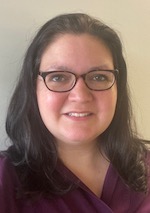This fall, we welcomed a new staff member, Rowie Lund, to the TARSS team. Lund’s professional background includes more than 20 years in the early childhood sector. In this Q & A she talks about her career path and her new role as the TARSS relationship-based professional development (RBPD) specialist.

What was the educational and career journey that led to your current role at CEED?
RL: I began my child care career as a camp counselor at YMCA Camp Icaghowan while I was in college. After getting my BA in psychology, I worked with younger children in a pre-K camp and a K–1 after-school program in Lincoln, Massachusetts, eventually finding my niche in early childhood. While we were living near Boston, I also had the opportunity to study flute and film scoring at Berklee College of Music, a lifelong dream of mine! While I decided not to pursue a music career, music has been an integral part of my teaching.
Some highlights of my career include teaching enrichment lessons at KinderCare, leading parent-child music classes, and expanding child care capacity as a center director in Wisconsin and Minnesota. In 2017, I became a Parent Aware Quality Coach for Carver and Scott Counties. During my time there, I spearheaded a new learning community and found a new spark for supporting and mentoring adult learners. The early childhood field is so demanding. Adults deserve the same care and attentiveness that we offer our students. I am very excited to be a part of the TARSS team at CEED, where I can continue to learn and grow while supporting adults in the field.
What are you most excited about in your new role as TARSS RBPD specialist?
We are launching new online learning communities for trainers and RBPD specialists in Minnesota. I am excited to offer this chance for trainers and coaches to connect with each other and grow (in both numbers and capacity). The feeling of belonging to a community is so regenerative and essential. I am hopeful that people in these learning communities will form new friendships and collaborations, get more joy and meaning from their work, and feel supported in continuing their important jobs.
What is something that most people don’t know about the early childhood sector?
Most people do not understand how badly early childhood education needs public investment to survive. Early childhood educators are expected to stay in the field out of the goodness of their hearts, even if it means low compensation and few or no benefits. Early childhood education is truly one of the most demanding professions in existence. Physically, you need to be active most of the day, which for some educators can be as long as 10–12 hours. Emotionally, you need to maintain your calm in chaotic, loud environments with very few breaks, especially if you are a family child care provider. Funding and public investment in early childhood are essential to keep our littlest learners safe and thriving, especially post-pandemic. The return on investment is seen in better outcomes for children which leads to improved communities and a better-educated workforce.
What are some of your interests and hobbies outside of work?
I have four children ages 1, 4, 8, and 11, so most of my free time is spent playing with my kids and helping with homework. When I do have the time, I enjoy writing songs, swimming, canoeing, reading, and scrapbooking. I also love to go out to live theater, dance, concerts, and musicals.
Related subjects
Tags: child care, early childhood education, professional development, staff and faculty, TARSS, training

